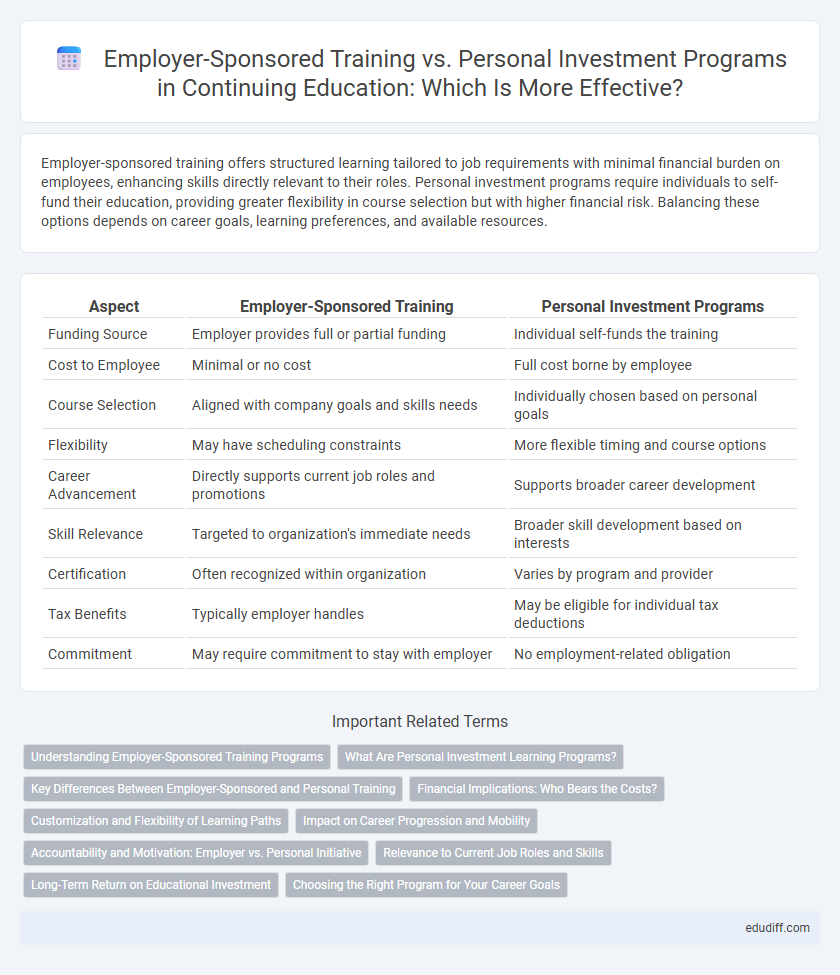Employer-sponsored training offers structured learning tailored to job requirements with minimal financial burden on employees, enhancing skills directly relevant to their roles. Personal investment programs require individuals to self-fund their education, providing greater flexibility in course selection but with higher financial risk. Balancing these options depends on career goals, learning preferences, and available resources.
Table of Comparison
| Aspect | Employer-Sponsored Training | Personal Investment Programs |
|---|---|---|
| Funding Source | Employer provides full or partial funding | Individual self-funds the training |
| Cost to Employee | Minimal or no cost | Full cost borne by employee |
| Course Selection | Aligned with company goals and skills needs | Individually chosen based on personal goals |
| Flexibility | May have scheduling constraints | More flexible timing and course options |
| Career Advancement | Directly supports current job roles and promotions | Supports broader career development |
| Skill Relevance | Targeted to organization's immediate needs | Broader skill development based on interests |
| Certification | Often recognized within organization | Varies by program and provider |
| Tax Benefits | Typically employer handles | May be eligible for individual tax deductions |
| Commitment | May require commitment to stay with employer | No employment-related obligation |
Understanding Employer-Sponsored Training Programs
Employer-sponsored training programs provide employees with skill development opportunities funded and organized by their company, often tailored to specific job roles and organizational goals. These programs typically include workshops, online courses, certifications, and on-the-job training designed to enhance employee performance and career growth within the company. Understanding the structure, eligibility, and benefits of employer-sponsored training helps employees leverage these resources effectively for professional advancement without personal financial burden.
What Are Personal Investment Learning Programs?
Personal Investment Learning Programs refer to educational courses or skill development initiatives funded and managed by individuals rather than employers, often tailored to specific career goals or personal growth objectives. These programs typically include workshops, certifications, online courses, or degrees purchased directly by employees, allowing greater flexibility and control over learning content and pace. Unlike employer-sponsored training, personal investment programs require self-motivation and financial commitment but may offer broader opportunities for professional advancement and diversification of skills.
Key Differences Between Employer-Sponsored and Personal Training
Employer-sponsored training typically covers specific skills aligned with company goals and offers financial support, reducing employee costs significantly. Personal investment programs allow individuals to choose diverse learning paths tailored to personal career aspirations, often requiring self-funding and greater time commitment. Employer-sponsored programs usually provide structured learning environments with access to internal resources, while personal programs emphasize flexibility and autonomy in skill development.
Financial Implications: Who Bears the Costs?
Employer-sponsored training programs typically cover the full cost of courses, materials, and certification fees, reducing the financial burden on employees and encouraging skill development aligned with company goals. Personal investment programs require individuals to shoulder tuition, exam fees, and associated expenses, often relying on personal savings or loans, which can lead to higher upfront costs but greater control over course selection. Understanding these financial implications helps professionals weigh immediate expenses against long-term career benefits when choosing between employer-sponsored and personal training options.
Customization and Flexibility of Learning Paths
Employer-sponsored training programs often offer structured curricula tailored to align with company goals, providing less customization for individual learning preferences. Personal investment in training allows learners to select courses that meet their specific career objectives and adopt flexible schedules accommodating their personal pace. This flexibility in personal programs supports diverse learning paths, fostering skill development closely tuned to individual needs.
Impact on Career Progression and Mobility
Employer-sponsored training often accelerates career progression by providing targeted skill development aligned with organizational goals, enhancing internal mobility within the company. Personal investment programs allow professionals to pursue diverse qualifications tailored to broader career aspirations, fostering external mobility and adaptability in the job market. Both approaches contribute to career growth, yet employer-sponsored training tends to boost loyalty and advancement within a single organization, while personal investment supports long-term versatility and marketability.
Accountability and Motivation: Employer vs. Personal Initiative
Employer-sponsored training fosters accountability through structured timelines, clear objectives, and regular performance evaluations, enhancing employee motivation within a collaborative environment. Personal investment programs rely heavily on individual discipline and intrinsic motivation, often requiring self-imposed deadlines and proactive learning strategies. Companies benefit from increased employee engagement when accountability mechanisms are integrated into training, while personal initiatives demand strong self-regulation to achieve similar outcomes.
Relevance to Current Job Roles and Skills
Employer-sponsored training directly targets skills and knowledge essential to current job roles, enhancing immediate work performance and aligning employee capabilities with organizational goals. Personal investment programs offer broader learning opportunities that may diversify skill sets but often lack direct applicability to specific job functions. Prioritizing employer-sponsored training ensures relevance and maximizes return on investment by addressing current workplace demands and competency gaps.
Long-Term Return on Educational Investment
Employer-sponsored training often delivers a higher long-term return on educational investment by aligning skill development directly with organizational goals and career advancement opportunities. Personal investment programs, while offering customization and broader learning options, may face challenges in immediately translating skills into measurable career growth or salary increases. Evaluating ROI requires analyzing both immediate applicability and potential for sustained professional growth over time.
Choosing the Right Program for Your Career Goals
Selecting the appropriate training program hinges on aligning employer-sponsored options or personal investment programs with specific career objectives. Employer-sponsored training often provides tailored skill development directly relevant to current job roles, enhancing immediate workplace performance and potential promotion opportunities. Personal investment programs offer greater flexibility and specialization, enabling long-term career advancement and adaptability across industries.
Employer-Sponsored Training vs Personal Investment Programs Infographic

 edudiff.com
edudiff.com